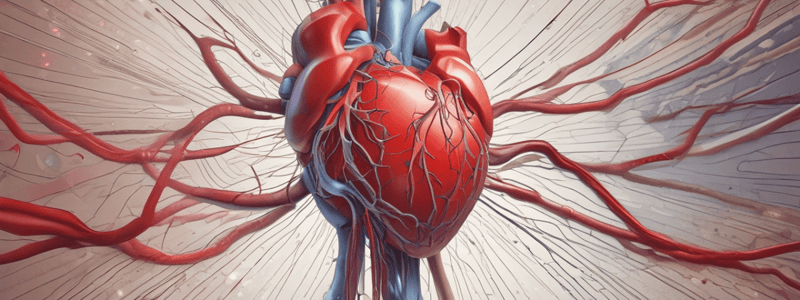Podcast
Questions and Answers
What is the primary cause of systemic hypotension and cerebral hypoperfusion in reflex syncope?
What is the primary cause of systemic hypotension and cerebral hypoperfusion in reflex syncope?
- Vasoconstriction and bradycardia
- Vasodilatation and/or bradycardia (correct)
- Vasoconstriction and tachycardia
- Vasodilatation and tachycardia
Which of the following is a characteristic of cardiac syncope?
Which of the following is a characteristic of cardiac syncope?
- A drop in blood pressure due to a postural change
- A reflex reaction resulting in vasodilatation and/or bradycardia
- A brief loss of consciousness due to a structural or electrical defect (correct)
- A slow heart rate with no underlying cardiac abnormalities
What is the primary consequence of orthostatic hypotension?
What is the primary consequence of orthostatic hypotension?
- Hypoperfusion and a brief loss of consciousness
- Cerebral hypoperfusion and a prolonged loss of consciousness
- Hypoperfusion leading to fall-related morbidity and mortality (correct)
- Hypoperfusion and a permanent loss of consciousness
Which of the following is an example of reflex syncope?
Which of the following is an example of reflex syncope?
Which of the following medications is a common cause of orthostatic hypotension?
Which of the following medications is a common cause of orthostatic hypotension?
Which of the following conditions is a risk factor for cardiac syncope?
Which of the following conditions is a risk factor for cardiac syncope?
Study Notes
Classification of Syncope
- Classification of syncope groups causes by common pathophysiology, presentation, and risk
Reflex Syncope
- Also known as neutrally mediated syncope
- A reflex reaction causes vasodilatation and/or bradycardia, leading to systemic hypotension, cerebral hypoperfusion, and brief loss of consciousness (TLOC)
- Examples: vasovagal syncope, situational syncope, carotid sinus syncope, and episodes with no apparent triggers
Cardiac Syncope
- Brief loss of consciousness due to structural or electrical defects that prevent the heart from pumping enough blood to fully perfuse the brain
- More likely to occur in patients with pre-existing cardiac abnormalities, family histories of cardiac anomalies, or sudden death
Orthostatic Hypotension (OH)
- A drop in blood pressure due to postural change (e.g., from seated/lying to standing)
- Leads to hypoperfusion
- A significant contributor to fall-related morbidity and an independent predictor of mortality
- Common causes: drugs (alpha-blockers, central sympatholytics, diuretics), illnesses (Parkinson's disease, peripheral neuropathy, dementia with Lewy bodies)
Studying That Suits You
Use AI to generate personalized quizzes and flashcards to suit your learning preferences.
Description
Test your knowledge on the classification of syncope, including reflex syncope, and its relation to risk stratification. Learn about the pathophysiology, presentation, and risk factors associated with this condition. Understand the causes and effects of systemic hypotension, cerebral hypoperfusion, and brief loss of consciousness.





